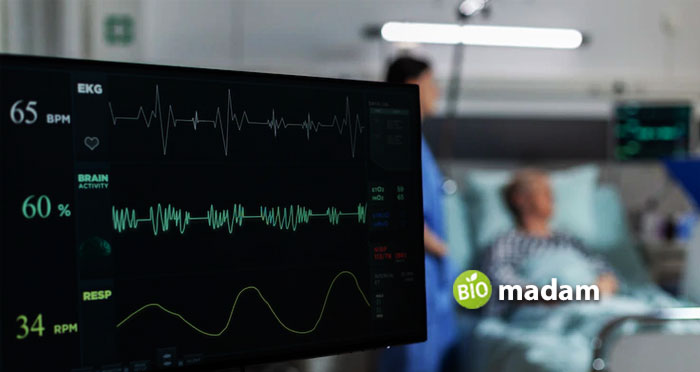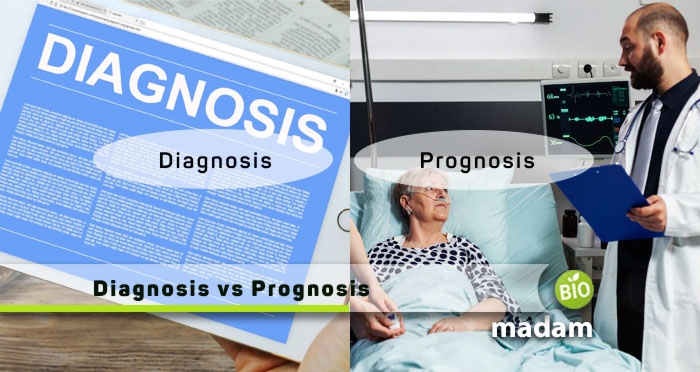Recently updated on October 5th, 2023 at 05:54 am
Diagnosis and prognosis are two important factors when observing signs and symptoms. When you visit a doctor with symptoms of an infection or a disease, the first step is making the diagnosis. They are also concerned about the prognosis of the condition besides diagnosis. A prominent difference between diagnosis and prognosis is that diagnosis lets you understand the disease. Contrarily, the prognosis shows how the disease will progress. It also involves evaluating the chances of recovery or recurrence. Diagnosis and prognosis play a vital role in determining and prescribing an adequate treatment.
Comparison Table
| Characteristic | Diagnosis | Prognosis |
| Literal Meaning | Dia – Through | Pro – Forward |
| Order | First | Later |
| Factors | Symptoms, family history, and clinical examination | Course of disease |
| Concerned Time | Present | Future |
| Duration | Short or long | Spread over a long time |
| Example | MRI, ECG, CT scan | Covid-19 symptoms and complications |
What is Diagnosis?
Diagnosis refers to determining a person’s disease based on the presented signs and symptoms. Examining the apparent signs is just the first step of diagnosis. Physicians utilize various other methods like laboratory tests to find out the disease. The diagnostic process involves collecting information about the patient’s present condition and medical history. The physician asks specific questions to evaluate the situation.
Some conditions like seasonal cough or flu can be diagnosed by physical examination only. However, if the diagnosis is not clear through presentation and history, a clinical examination is carried out. Clinical evaluation includes blood tests, radiography, ECG, CT scan, MRI, etc.

What is Prognosis?
The prognosis is the prediction of the probable prognosis of a disease. It usually depends on past experiences about how the disease presents itself. Prognosis also involves determining the chances of recovery and recurrence. It includes the development of the symptoms, the likelihood of survival, and possible complications. The physician may be able to tell you if the symptoms will worsen or remain stable and if you can carry out your daily activities.
While the prognosis is typically accurate for most patients, sometimes it may not be perfect. Each disease or condition has a particular route. However, some are different for each individual. Your prognosis might not go exactly per the doctor’s prediction because of any complications.
Differences Between Diagnosis and Prognosis
Definition

Diagnosis
Diagnosis is a medical term for understanding the patient’s disease through signs and symptoms.
Prognosis
Prognosis is the prediction of the progression, recovery, or recurrence of the disease.
Literal Meaning
Diagnosis
Dia means across or through representing the present condition.
Prognosis
However, pro means forward, explaining the development of the condition.
Order
Diagnosis
Diagnosis is performed first to evaluate the condition.
Prognosis
Contrarily, the prognosis is carried out after diagnosis to understand the condition better.
Factors
Diagnosis
The diagnosis involved presenting symptoms, family history, and clinical examination. Diagnostic tests may be carried out per need.
Prognosis
The prognosis is based on the information obtained from previous cases. It tells you the typical course of the disease, the development of symptoms, comorbidities, and any other related complications.
Concerned Time
Diagnosis
The concerned time frame for diagnosis is the present. It deals with the patient’s condition when they present to you with their symptoms.
Prognosis
In contrast, the prognosis is about the future. It gives the patient and the physician an insight into the possible progression of the disease and what to expect.
Duration
Diagnosis
The duration of diagnosis could be short or extensive per need.
Prognosis
Alternatively, the prognosis is typically a longer process and may last over the years, depending on the patient’s condition.
Example
Diagnosis
One example of diagnosis includes a CT scan or an X-ray for a head injury or an ECG for cardiac issues.
Prognosis
An example of prognosis is the possible symptoms of Covid-19 infection through the course of the virus.
The Bottom Line
While diagnosis refers to understanding the disease, prognosis represents development. Diagnosis and prognosis are immensely important to treat a disease properly. If the physician does not make the right diagnosis or fails to evaluate the prognosis adequately, it can worsen the condition. The prognosis is typically based on previous observations of the condition. On the contrary, diagnosis is made through clinical presentation, medical history, and diagnostic tests.
FAQs
What is the medical definition of prognosis?
Cancer.gov defines prognosis as “The likely outcome or course of a disease; the chance of recovery or recurrence.”
Why is it important to know the difference between diagnosis and prognosis?
Understanding the difference between diagnosis and prognosis enables you to find the right way to manage and treat disease. Diagnosis helps you determine an appropriate treatment, while prognosis may save you from complications if possible.
What is the difference between diagnosis and treatment?
The major difference between diagnosis and treatment is that diagnosis does not relieve the symptoms. It only tells you what the condition is. Alternatively, treatment lets you resolve the issue through medication and therapy.

Jeannie has achieved her Master’s degree in science and technology and is further pursuing a Ph.D. She desires to provide you the validated knowledge about science, technology, and the environment through writing articles.

